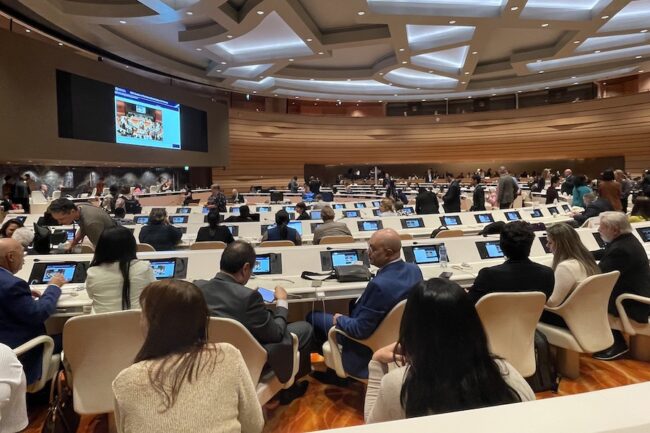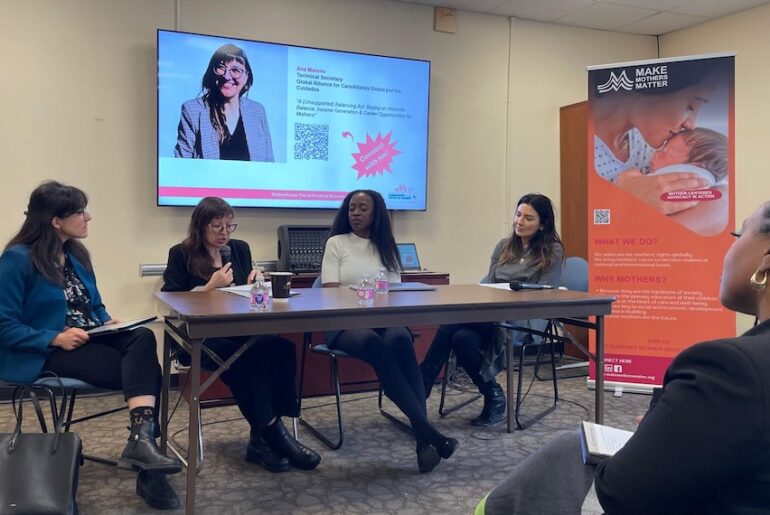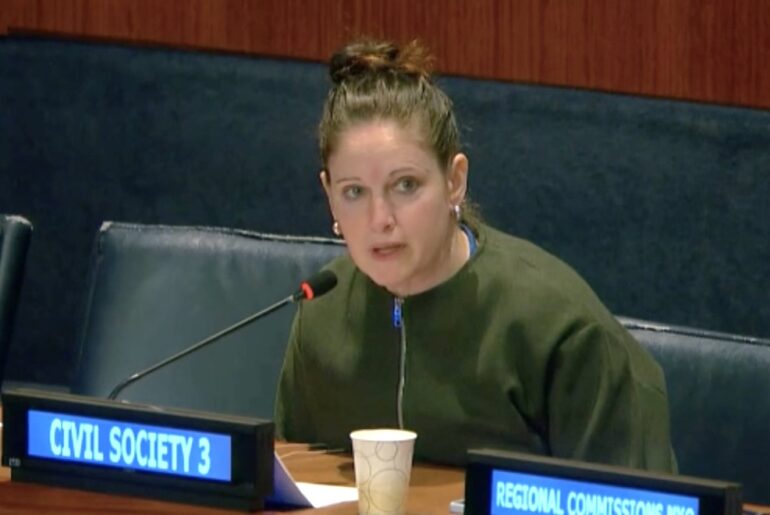What mothers need from a care economy
16.06.24
UN Geneva – A general discussion on decent work and the care economy was on the agenda of the 112th International Labour Conference (ILC), which took place over the past two weeks. MMM was there, providing input to a packed session during the first sitting of the Committee in charge of elaborating and negotiating a resolution on the topic.

In her short intervention on behalf of MMM, Mélanie Nedelec put forward 3 key messages:
- First, we know that mothers suffer specific discriminations in the labour market, and that the gender pay gap is largely due to motherhood, but the data remain scarce. We need a statistical framework to measure this motherhood penalty, so that it can be properly monitored and addressed.
- Second, unpaid caregivers develop skills, notably organisational and soft skills, which are very much in demand in the labour market. We need to take a holistic approach to work and consider unpaid care work as a valuable work experience, not a hindrance.
- Lastly, unpaid care work is a collective responsibility, and the private sector must take its share, by supporting mothers and other caregivers. This is an investment that also brings benefits like talent acquisition and retention, and employee loyalty. It is time for a paradigm change: from mothers and other caregivers adapting to companies, to companies adapting to the constraints of caregiving.

Only our last point on co-responsibility is included in the resolution concerning decent work and the care economy, which promotes “social co-responsibility among the State, the private sector, families, the social and solidarity economy (SSE) and the community. “
Still, this resolution, which was negotiated during several days of talks between the International Labour Organisation’s (ILO) three constituents – i.e. governments, employers, and workers – Includes many positive elements to support our future advocacy. In particular:
- It establishes that “care is central to human, social, economic and environmental well-being, and sustainable development” and that “care work, paid and unpaid, is essential to all other work”
- It recognises that “the current social organisation of care, that is who provides care and who accesses care, places a disproportionate share of unpaid care work on women, which hinders women’s economic inclusion and effective labour market participation, widening gender gaps in the world of work, and leaves many without adequate access to social protection”
- It reaffirms that “just as labour is not a commodity, labour in the care economy is not a commodity. All people should be able to provide and receive care, including self-care”, and that “provision of, access to and receipt of care should be based on the principles of non-discrimination, solidarity, sustainability, equity, universality, and social co-responsibility”.
Among others, the resolution also calls the ILO’s constituents to:
- “Mainstream care into relevant public policies”
- “Address the unequal gender distribution of paid and unpaid work, and promote women’s economic inclusion and autonomy beyond caregiving, including by changing social norms and gender stereotypes around caregiving roles”
- “Build and maintain universal social protection systems that provide adequate protection for care workers in all types of employment and recognise unpaid care work, including through care credits in social insurance”.
All points that we have regularly advocated for.
The topic of care, including the issue of women’s disproportionate share of unpaid care and domestic work, is now firmly on the ILO’s agenda, and the urgent need for action recognised. We at MMM remain committed to continue to expose the specific discriminations and challenges faced by mothers in the context of the Care economy.
See also, the ILO’s report on Decent work and the care economy, which was prepared ahead of the Conference to facilitate the general discussion.
Time Poverty and the Motherhood Penalty
Unveiling Economic and Social Injustices
09.07.24
Mothers play an essential role in families by ensuring their loved ones are nourished, educated, and healthy, but their unpaid care work often leads to economic and social injustices, known
Envisioning care as a common thread to global crises
29.07.24
UN New York - Our virtual HLPF side-event brought together experts to shed light on how the various global crises we face (in particular climate change and other environmental crises,
We call for multi-stakeholder approach to recognise and support unpaid care work
21.07.24
UN New York - Participating in the meeting of the UN Economic and Social Council (ECOSOC) on care and support systems, MMM reaffirmed the principle of co-responsibility, which should underpin








